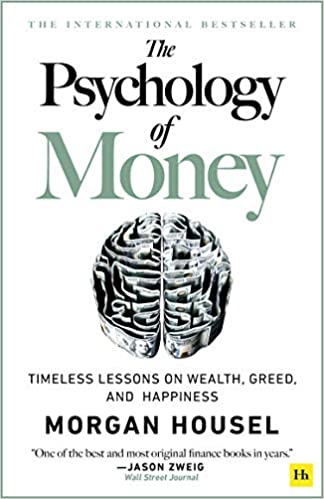Book Review by Taylor Berrett
Much has already been written about the way people think about, understand, and handle money and wealth. It’s a rich psychological well to draw from, and it’s also vitally important— how people think about their money and the money of others can have a major impact on whether they’re financially successful in life and business.
Morgan Housel is the latest successful finance expert to take on this topic in a book of his own, with The Psychology of Money: Timeless Lessons on Wealth, Greed, and Happiness. While Housel’s work is very obviously informed by data and research, he spends less of the book’s relatively compact 200 pages with charts and analysis and more on anecdotes and stories.
The result is a book that seems to recognize that much of investing is dependent on uncontrollable outside factors, and the only real factor inside of everyone’s control is individual psychology. Housel sees incorrect mindsets as the #1 biggest roadblock to better investing and money decisions, and his book combines experiences from his own life with a wide range of 3rd party stories to flesh out this concept quite convincingly.
A Refreshingly Opinionated Take on Financial Advice
What separates Housel’s book from the infinite ocean of financial advice found in libraries, blogs, podcasts, and Twitter feeds? Housel’s storytelling ability is certainly one major factor— he has a knack for creating an engaging narrative that helps guide the reader from the premise to a logical conclusion in an entertaining and straightforward way.
But what also sets Housel’s book apart is that he’s willing to take a stance on the world of financial advice. Housel acknowledges how much of this advice amounts to the same basic platitudes repeated on and on into infinity while being filled with conflicting information and guidance based on nothing close to resembling fact.
This, in the end, is why Housel chooses to focus on the psychology of how individuals handle money— it’s the only thing that’s truly within our control.
Housel almost gleefully takes down the notions we have about genius in investing and titans of financial success like Warren Buffett. He has a skill for pointing out the many failures that can occur in finance without bogging down the reader in pessimism and defeatist ideas. After all, Housel wants you to handle money better.
The Takeaway
Overall, Housel’s book makes for an excellent general guide to smarter investing and finance for people first entering the world of financial independence. It may not have any groundbreaking investing advice for experienced investors— but that’s sort of the point. Housel is quick to acknowledge that even the best advice in finance is never a sure thing. He emphasizes the importance of developing a smart attitude towards money by looking inward, rather than outward at the markets.
One of the most compelling sections comes in the final chapters, when Housel turns the microscope on himself and provides an analytical look at his own financial story and relationship with money. It gives a firsthand account about his financial decisions and the psychology that inspired and informed them.
Overall, these moments are where The Psychology of Money shines— when Housel turns personal experiences into compelling stories that readers can relate to their own financial goals and mindsets. Hardcore finance nerds may not find as much hard data and research as they’d like, but anyone who wants to generally improve their approach to money will find a lot to love.
______________________________________________________________________________

Taylor Berrett is a freelance writer, editor, and host of the podcast Alone in a Room.





